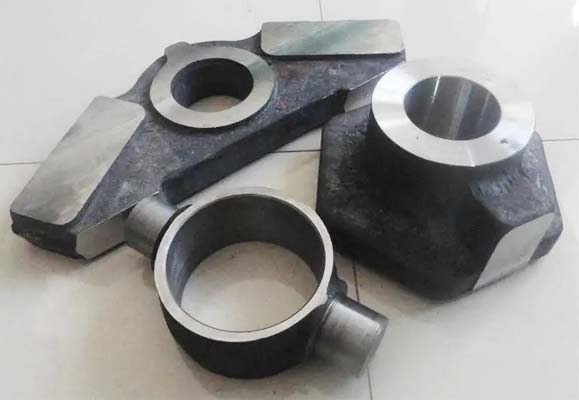- Contact Innally, Let you purchase forgings in China more favorable prices, products more assured!
- Hotline:+(86)15038323776 Email:innally@innally.com
Process characteristics and application of construction machinery forgings
- Category: Construction machinery forgings, Titanium alloy forging
- |
- Date: 10/10/2023
With the continuous expansion of construction machinery application fields, such as ocean engineering, aerospace engineering, new energy and other fields, the demand for high-performance, special purpose construction machinery forgings will continue to increase. Therefore, the forging process needs to further expand the application field, and develop high-performance forgings that adapt to the needs of different fields.
Product Details
As a key component, construction machinery forgings play a vital role in mechanical equipment. They are not only under great pressure, but also need to work stably in a variety of complex environments, so the performance requirements for their strength, wear resistance, fatigue resistance and reliability are very strict. This paper will introduce the process characteristics and application of construction machinery forgings.
First, process characteristics
Heating link
Forging heating is a process to improve the plasticity of metal materials, through heating the metal material to reach the temperature of plastic deformation, in order to carry out pressure processing. Construction machinery forgings are usually heated by electric furnaces, gas furnaces or reflector furnaces, and the heating temperature depends on the type of metal materials and forging requirements. In the heating process, the heating speed and temperature should be strictly controlled to prevent overburning, oxidation, decarbonization and other problems.

Pressure link
The pressure link is the most important part of the forging process, which deforms the metal material by applying pressure to achieve the desired shape and size. Construction machinery forgings are usually pressurized by means of hydraulic presses, mechanical presses or hammering. In the process of pressurization, the mold and die should be selected reasonably, and the deformation amount and deformation speed should be controlled to prevent cracks, inclusions, bubbles and other problems.
Cooling link
The cooling after forging is also one of the key links, which is of great significance for improving the quality and performance of forging parts. Construction machinery forgings are generally cooled by natural cooling or forced cooling. During the cooling process, the cooling speed should be controlled to prevent the problem of excessive or insufficient quenching. At the same time, for some large forgings, it is also necessary to use annealing heat treatment process to eliminate internal stress and improve fatigue resistance.
Ii. Application
Excavator forging
Excavator is an important equipment in construction machinery, and its working process needs to bear great load and impact. Therefore, the quality and performance requirements of excavator forgings are very strict. Forging process is very important to the production of excavator forgings, among which die forging process is the most common. The forging process can produce forgings with high strength, wear resistance and fatigue resistance, which can meet the needs of long-term high-intensity work of excavators.
Loader forging
Loader is another common construction machinery, its work is characterized by frequent loading and unloading and handling. Therefore, loader forgings need to have high fatigue resistance and durability. Free forging process is a common method for producing loader forgings. Free forging process can produce forgings with high strength and durability through free deformation and control of metal materials to meet the needs of loaders.
Third, future development direction and trend
With the continuous progress of science and technology and the continuous development of construction machinery industry, the production and application of construction machinery forgings will also continue to improve. In the future, construction machinery forgings will develop in the following directions:
High efficiency and energy saving: The future forging process will pay more attention to improving production efficiency and reducing energy consumption, and adopt more environmentally friendly and energy-saving equipment and processes to improve production efficiency and quality.
Precision molding: With the development of construction machinery in the direction of lightweight, miniaturization and precision, the accuracy and quality requirements for forgings are becoming higher and higher. Therefore, precision forming technology and high-precision die will become an important development direction of forging process.
Intelligent manufacturing: Intelligent manufacturing is an important development trend of the future manufacturing industry, and the production of construction machinery forgings will also develop in the direction of intelligence and automation. Through the introduction of artificial intelligence, the Internet of Things and other technologies, the intelligent monitoring, optimization and management of the production process is realized, and the production efficiency and product quality are improved.
With the continuous expansion of construction machinery application fields, such as ocean engineering, aerospace engineering, new energy and other fields, the demand for high-performance, special purpose construction machinery forgings will continue to increase. Therefore, the forging process needs to further expand the application field, and develop high-performance forgings that adapt to the needs of different fields.
nannan
INNALLY mainly provides you with various types of cast and forged parts products. Welcome your inquiries! innally@innally.com
Related Products
Search
Forging center
- Steel forgings
- Aluminium alloy forging
- Titanium alloy forging
- Stainless steel forging
- Copper forging
- Automotive forgings
- Locomotive forging
- Bicycle forgings
- Motorcycle forging
- Rigging and fasteners
- Bearing forging
- Electric power fittings
- Marine forging
- Mechanical forgings for metalworking
- Mining machinery forgings
- Marine engineering forgings
- Construction machinery forgings
Popular product

© 2025. All Rights Reserved.






